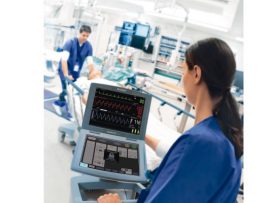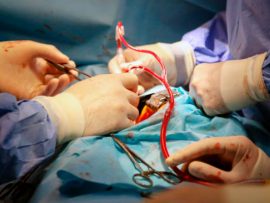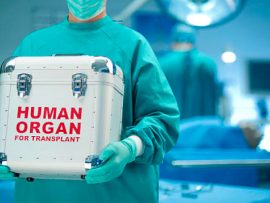Abstract Objective Preoperative anemia management reduces red blood cell (RBC) transfusion and adverse outcomes, but how best to optimize the patient’s hemoglobin (Hgb) before cardiac surgery remains unclear. The authors..
Read MoreIntroduction Lactic acidosis after cardiac surgery with cardiopulmonary bypass is common and associated with an increase in postoperative morbidity and mortality. A number of potential causes for an elevated lactate..
Read MoreCardiosave es un dispositivo de vanguardia que proporciona una terapia de contrapulsación intraaórtica fiable y absolutamente probada. Getinge diseñó Cardiosave para aportar mayor flexibilidad de uso tanto en configuración hospitalaria..
Read MoreBackground There is a lack of consensus on how to manage anticoagulation during veno-venous extracorporeal membrane oxygenation, including antithrombin monitoring and supplementation. The authors’ aim was to determine current practice..
Read MoreThe use of veno-arterial extracorporeal membrane oxygenation (VA-ECMO) as a salvage therapy in cardiogenic shock is becoming of current practice. While VA-ECMO is potentially a life-saving technique, results are sometimes mitigated, emphasising the need for selecting..
Read MoreVenoarterial extracorporeal membrane oxygenation has emerged as a viable treatment for patients in cardiogenic shock with biventricular failure and pulmonary dysfunction. Advances in pump and oxygenator technology, cannulation strategies, patient selection and management, and durable mechanical circulatory support have..
Read MoreAbstract Extracorporeal membrane oxygenation (ECMO) refers to specific mechanical devices used to temporarily support the failing heart and/or lung. Technological advances as well as growing collective knowledge and experience have..
Read MoreBackground Venoarterial extracorporeal membrane oxygenation (V-A ECMO) improves perfusion and oxygenation in patients with cardiogenic shock. However, it can also result in supranormal oxygen exposure. Recent evidence suggests hyperoxia may..
Read MoreBackground Post-cardiotomy cardiogenic shock (PCCS) has an incidence of 2–6 % after routine adult cardiac surgery. 0.5–1.5 % are refractory to inotropic and intra-aortic balloon pump (IABP) support. Advanced mechanical circulatory support..
Read MoreBackground Postcardiotomy cardiogenic shock (PCCS) refractory to inotropic support and intra-aortic balloon pump (IABP) occurs rarely but is almost universally fatal without mechanical circulatory support. In this systematic review and..
Read MoreBackground The efficacy of extracorporeal membrane oxygenation (ECMO) in bridging children with unrepaired heart defects to a definitive or palliative surgical procedure has been rarely reported. The goal of this..
Read MoreBACKGROUND: No consensus exists on the optimal settings of mechanical ventilation during veno-venous extracorporeal membrane oxygenation (ECMO). Our aim was to describe how mechanical ventilation and related interventions are managed..
Read MoreSevere cases of coronavirus disease 2019 (COVID-19) cannot be adequately managed with mechanical ventilation alone. The role and outcome of extracorporeal membrane oxygenation (ECMO) in the management of COVID-19 is..
Read MoreThe use of extracorporeal membrane oxygenation has had a positive impact on the outcomes after lung transplantation. Extracorporeal membrane oxygenation has a role in all phases of lung transplantation—preoperative, intraoperative,..
Read MoreAcute Respiratory Distress Syndrome (ARDS) is one of the most demanding conditions in an Intensive Care Unit (ICU). Management of analgesia and sedation in ARDS is particularly challenging. An expert..
Read MoreVenovenous extracorporeal membrane oxygenation (vv-ECMO) has been classically employed as a rescue therapy for patients with respiratory failure not treatable with conventional mechanical ventilation alone. In recent years, however, the..
Read MorePurpose Extracorporeal membrane oxygenation (ECMO) is a rescue therapy for patients with acute respiratory distress syndrome (ARDS). The aim of this study was to evaluate associations between ventilatory settings during..
Read MoreAbstract Rationale: Current practices regarding mechanical ventilation in patients treated with extracorporeal membrane oxygenation (ECMO) for acute respiratory distress syndrome are unknown. Objectives: To report current practices regarding mechanical ventilation in patients..
Read MoreCurrently, many centers use venovenous extracorporeal membrane oxygenation (VV-ECMO) as an adjunctive means of gas exchange to mechanical ventilation (MV) in patients with severe ARDS and refractory hypoxemia. One of..
Read MoreMechanical ventilation (MV) is a crucial element in the management of acute respiratory distress syndrome (ARDS), because there is high level evidence that a low tidal volume of 6ml/kg (protective..
Read MoreObjective Cerebral autoregulation (CA) impairment may pose a risk factor for neurological complications among children supported by extracorporeal membrane oxygenation (ECMO). Our first objective was to investigate the feasibility of..
Read MoreSevere respiratory syndrome coronavirus-2 is responsible for coronavirus disease 2019 (COVID-19), which may lead to acute respiratory failure. In its most severe manifestation including refractory hypoxemia and/or hypercapnia, it can..
Read MoreAbstract The role of extracorporeal membrane oxygenation (ECMO) in the management of critically ill COVID-19 patients remains unclear. Our study aims to analyze the outcomes and risk factors from patients..
Read MoreThe Coronavirus Disease 2019 (COVID-19) pandemic has required rapid and effective protocol adjustments at every level of healthcare. The use of extracorporeal membrane oxygenation (ECMO) is pivotal to COVID-19 treatment..
Read MoreBackground Extracorporeally induced whole‐body hyperthermia (eWBH) might be a beneficial treatment in cancer patients. Objectives of this pig study were to assess thermal distribution, (patho‐)physiological effects, and safety of eWBH..
Read MoreAbstract Purpose Emerging evidence suggests that hyperthermic intraperitoneal chemotherapy (HIPEC) with cytoreductive surgery (CRS) shows a survival benefit over CRS alone for patients with epithelial ovarian carcinoma (EOC). This systematic..
Read Morefecha mision: ++++++++++ objetivo de la mision: ++++++++ Contacto: ++++++++++ link pagina
Read MoreAbstract Background The role of vascular endothelial growth factor (VEGF)-induced 3 different nitric oxide synthase (NOS) isoforms in lung development and injury in the newborn (NB) lung are not known...
Read MoreAbstract Background After cardiac surgery, postoperative delirium (POD) is common and is associated with long-term changes in cognitive function. Impact on health-related quality of life (QOL) and long-term dependence are..
Read MoreThe data article refers to the paper titles “Impact of malnutrition on long-term survival in adult patients after elective cardiac surgery” . The data refer to the analysis of the relationship..
Read More















